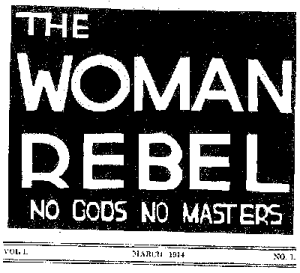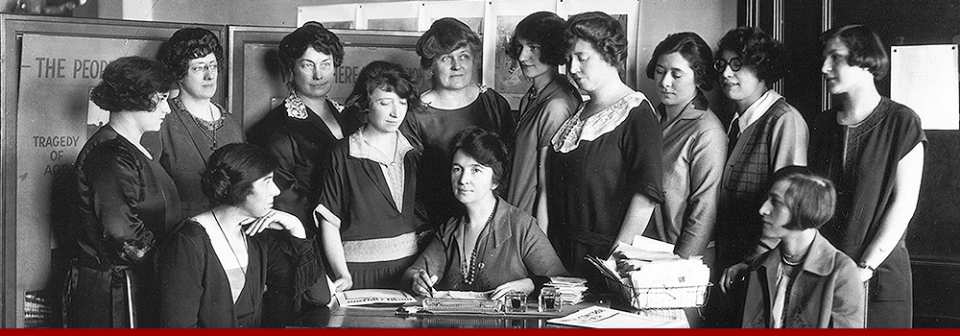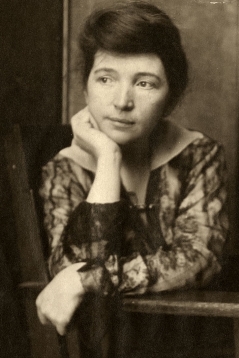Tags
Sanger was an avid reader of Nietzsche [1844-1900], a German philosopher known for his work on religion, morality and mass culture. He was perhaps best known for his insistence that “God is dead”, suggesting that modern secular society had ‘killed’ the Christian God.

“No Gods No Masters” was Sanger’s interpretation of a French saying Nietzsche quoted, “Ni dieu ni maître!” (‘Neither God nor master’)
Sanger found this fascinating because Nietzsche proposed that the Christian God was the basis for moral thinking for centuries. This meant that the figurative death of God placed traditional morality in question. Sanger was not a supporter of traditional morality in any sense; it seemed to only hinder her goals. She believed that “Nietzsche philosophy not only calls in question the moral law itself it challenges & attacks the foundation of all moral law.” (Frederick Nietzsche).
Nietzsche called for the defeat of traditional religious morals, seeing no need for people to be restrained by them in a post-Christian world. He rejected the idea of a universal moral law, offering instead the individual ability to recreate a system of values. Nietzsche’s philosophy, for Sanger, represented the break from the traditional morality that imposed itself against her work. Birth control was often considered immoral in its potential for “abuse” by unmarried couples. Sanger’s concerns fell elsewhere; she saw herself acting morally by educating adults in the best methods of protecting themselves and offering control over family size. She was then able to allow people to create the best lives for themselves and their families that they could—she placed value on individual choice.
Perhaps important for Sanger was Nietzsche’s claim that those who are in power determine the morality of the masses. Nietzsche did not promote the elimination of a structured morality, rather, he suggested that it was good for the masses. He did, however, encourage anyone able to create their own ethics by following their own “inner law”. Sanger likely supported his individualistic morality, and she certainly recognized the imposition of morality on the people. Particularly notable was the burden of upper-class values on the working class. Large families, for example, were very difficult to maintain for working-class parents, who may not have had the money to support them. These imposed values were problematic because they did not represent the realities of people’s lives.
Supporters of traditional morality, very often opponents of birth control, also sought to preserve values like “purity”. Sanger saw instead that this opposition was propagating the poverty that lead to prostitution, criminal behavior, and suffering. She strived to abandon these imposed values of conventional morality.
Let us turn a deaf ear to the trumpet-tongued liars clamoring for Protection, Patriotism, Prisons, Police, Workhouses and Large Families. (No Gods)

Frederich Nietzsche, 1869
This is where Nietzsche’s other famous idea, the “Übermensch” (overman, superman, or super-human) comes into play. The overman is a beyond-human figure who creates new values, rising above notions of good and evil and the morality of the masses. The overman is an ideal human, someone who has developed his or her own ability to determine moral issues. While the overman served as the “goal” for humanity within Nietzsche, it seems to be an ideal he presented for the sake of encouraging new cultural values. Christian morality focused on Heaven—the world beyond this world—whereas Nietzsche sought to emphasize love for the current world and mortal life.
Where did Sanger stand on Nietzsche’s philosophy? She certainly appreciated a re-examination of traditional morality, and recognized that it would require a shift in values. She interpreted from her readings of Nietzsche that the individual is the creator of his or her own values. If we create our own values, then the standards we hold ourselves to in relation to those values (morality) are also created by us. In her notes on Nietzsche, she suggested that “the individual is the original source & constituent of all value. No other standard of obligations for you or for me than that set by our personal ends & ideals” (Frederick Nietzsche).
The “overman” that Sanger appreciated is one of Nietzsche’s more controversial ideas due to its appropriation at times by eugenics supporters. Speaking of Nietzsche, she stated “we have a right to extract from this or any philosophy that which we can use for our own purpose” (Frederick Nietzsche). She picked out whatever peices of Nietzsche she found suitable to support her cause. Sanger’s interpretation of the overman emphasized the “human ideal” not as a biological goal, but for its potential to recreate cultural values.
To our society apologists, and to their plausible excuses for modern oppression, the only adequate answer is–we have done with your civilization and your gods. We will organize society in such a way as to make it certain for all to live in comfort and leisure without bartering their affections or their convictions. (No Gods)
Sanger argued for elimination of those values she so despises—including large families—which stood in opposition to her stance on birth control. What she seemed to extract from Nietzsche’s philosophy was the potential for humanity it held—freedom from traditional morality and the creation of a new morality, perhaps more along the lines of what she observed within the world.


Pingback: Quote of the Day 6/4/14 | Sharp and Pointed
Interesting
though large families were not traditional or moral, in moral I am not sure
lack of birth control means many births, but they coincided with many deaths mainly at infancy thus remaining a family rather small